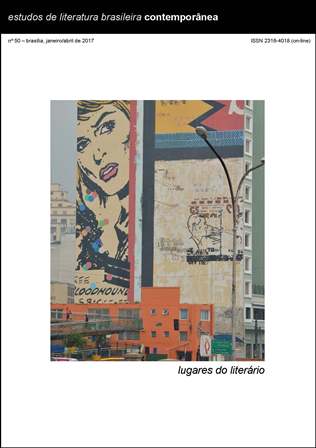A propósito de um irmão alemão:
a ficcionalização de um assunto internacional de família
DOI:
https://doi.org/10.1590/2316-4018504Abstract
Num contexto de reivindicações na literatura brasileira, veiculadas por novas vozes sociais, qual é a relevância de um grande nome da cultura brasileira, Chico Buarque (*1944), aos 70 anos, tomar conhecimento da existência de um meio-irmão alemão, Sergio Günther Ernst (1930-1981)? Irmão com quem nunca teve contato algum, já falecido há 30 anos? A princípio, nenhuma. Entretanto, o incidente internacional na história familiar do autor serviu como inspiração e fábula para o romance O irmão alemão, publicado em 2014, que se revela uma obra complexa pela sua transgressão de divisões de caráter diegético, político e cronológico. Neste artigo, pretendo examinar como a narrativa combina fatos e, inclusive, documentos históricos com uma trama imaginativa; como explora, indiretamente, a história traumática de regimes autoritários; e como trabalha, por meio de um “romance familiar”, as fantasias pelas quais estabelece vínculos com o pai e os irmãos.
References
BUARQUE, Chico (2014). O irmão alemão. São Paulo: Companhia das Letras.
DE MAN, Paul (1979). The rhetoric of romanticism. New York: Columbia University Press.
DOUBROVSKY, Serge (1977). Fils. Paris: Galilée.
FERNANDES, Márcia; PÉREZ-LABORDE, Elga (2014). Duas faces de uma mesma moeda: na fronteira da autoficção pós-moderna em O irmão alemão, de Chico Buarque. Cerrados, Brasília, v. 23, n. 38, p. 161-173.
FREUD, Sigmund (1909/1972). Der Familienroman der Neurotiker. In: FREUD, Sigmund. Gesammelte Werke: Werke aus den Jahren 1906-1909. Frankfurt am Main: S. Fischer, v. 7, p. 225-231.
GENETTE, Gérard (1969). Figures III. Paris: Seuil.
HOLANDA, Bartolomeu Buarque de (2007). Buarque ”“ Uma família brasileira. Rio de Janeiro: Casa da Palavra.
LECARME, Jacques; LECARME-TABONE, Eliane (1997). L’autobiographie. Paris: Armand Colin.
LEJEUNE, Philippe (1975). Le pact autobiographique. Paris: Seuil.
MOTA, Urariano (2005). O rei Roberto Carlos e a ditadura militar no Brasil. Carta Maior, São Paulo, 5 maio 2005. On-line. Disponível em: https://goo.gl/6KRdt0. Acesso em: 29 mar. 2016.
NEHER, Clarissa (2014). Historiador revela detalhes sobre “irmão alemão” de Chico Buarque. Deutsche Welle Brasil, 21 nov. On-line. Disponível em: http://dw.com/p/1DrJR. Acesso em: 29 mar. 2016.
RICOEUR, Paul (1990). Soi-même comme un autre. Paris: Seuil.
ROBIN, Régine (1992). L’autofiction. Le sujet toujours en défaut. In: FRÉDÉRIC, Madelaine (Org.). Entre l’histoire et le roman. La littérature personelle. Bruxeles: Centre d’études canadiennes de l’Université libre de Bruxelles, p. 231-265.
SILVA, Fernando de Barros e (2015). O irmão brasileiro: a busca de Chico Buarque em Berlim. Público, Lisboa, 25 jan. On-line. Disponível em: https://goo.gl/qsfzdH. Acesso em: 29 mar. 2016.
TRZOSS, Siggi (2009). Lexikon ”“ Schlager des Ostens. Berlin: Aperçu.
ZAPPA, Regina (2007). Para seguir minha jornada: Chico Buarque. Rio de Janeiro: Nova Fronteira.
Downloads
Published
Issue
Section
License
Authors who publish in this journal agree to the following terms:
a) The authors maintain the copyright and grant the journal the right of first publication, the work being simultaneously licensed under the Creative Commons Attribution License-Non Commercial 4.0 which allows the sharing of the work with acknowledgment of the authorship of the work and publication this journal.
b) Authors are authorized to enter into additional contracts separately, for non-exclusive distribution of the version of the work published in this journal (eg publish in institutional repository or as a book chapter), with authorship recognition and publication in this journal.
c) Authors are allowed and encouraged to publish and distribute their work online (eg in institutional repositories or on their personal page) after the editorial process, as this can generate productive changes, as well as increase the impact and citation of published work (See The Effect of Free Access).
d) The authors of the approved works authorize the magazine to, after publication, transfer its content for reproduction in content crawlers, virtual libraries and the like.
e) The authors assume that the texts submitted to the publication are of their original creation, being fully responsible for their content in the event of possible opposition by third parties.


